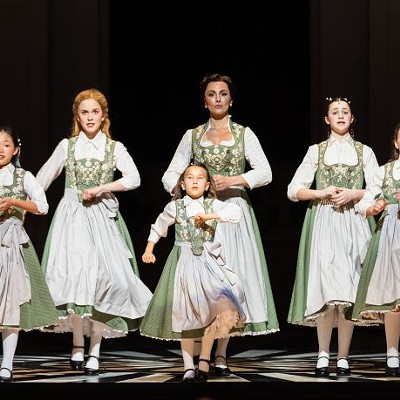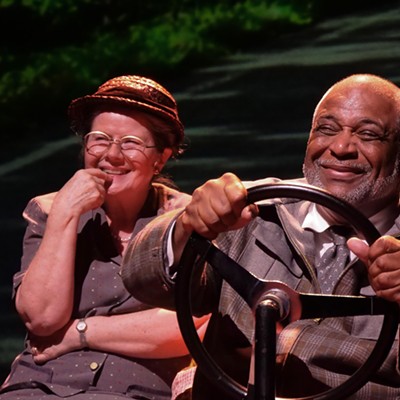St. Elmo's Fire came out 30 years ago. In June of 1985, to be precise. Yet even though this year marks the anniversary of its release, our notoriously nostalgia-heavy entertainment-industrial complex didn't go into its customary frenzy. I saw a handful of articles commemorating the event, most of which were of the listicle/clickbait variety (Five Best Scenes! Is Emilio Estevez Still Alive?). There was also a piece in Vanity Fair that hilariously tried to generate some sympathy for the cast, whose totes authentic real-life friendship was tragically torn asunder by fame's remorseless spotlight. But even these half-assed revisionist histories ignore the real issue: St. Elmo's Fire is a garbage movie about garbage people.
Written and directed by Joel Schumacher, who still had 12 years of moderate success ahead of him before the cinematic war crime that would forever stain his legacy. That tragedy could have been — indeed *should* have been — prevented, but we as a nation were not strong enough. Like Neville Chamberlain before us, we were misled by the passionate orations of a charismatic fascist. Our Hitler? Rob Lowe. His Reich Chancellery? The so-called "Brat Pack."
Americans are famed for looking back favorably on movies or events that were empirically terrible: fold-over jeans, Tony Danza, the first season of Star Trek: The Next Generation. Let's not make the same mistake with St. Elmo's Fire, a movie remarkable for the fact that every one of its main characters could be gunned down in a yuppie My Lai and not only would it be the least tragic mass murder of all time, I'm confident such an act would have reversed the effects of climate change and halted the rise of ISIS.
What follows, then, is proof of each character's loathsomeness, from least to most offensive.
7. Julianna "Jules" Van Patten (Demi Moore) — Whereas Billy (see below) is the party boy who refuses to move on from the good old days, Jules is the party girl who slides deftly from college excesses to those of the young professional. Aside from providing a bitter reminder that you used to be able to get a job with a bachelor's degree (or get an "advance" on a paycheck...the hell?), Jules is apparently supposed to be a cautionary tale about the perils of doing drugs or sleeping with your boss. In this sense, SEF perfectly captures the zeitgeist of the era of "Just Say No" and AIDS paranoia. Still, Jules is arguably the most sympathetic character here, even though she assumes Kevin is gay in spite of the fact he regularly wears camouflage pants with a sports coat, which is just about the least fabulous outfit imaginable.
She also tries to kill herself by leaving the windows open in 40 degree weather, which is second only to this as the lamest suicide attempt in movie history.
6. Leslie Hunter (Ally Sheedy) — The St. Elmo's Fire Wikipedia page states that Leslie "wants to pursue a career as an architect." I have (unfortunately) seen this movie three times (the most recent instance being a vodka-soaked ordeal specifically to assist in writing this) and I can tell you no mention is made of this. During her fight with Alec, he goes off on how much she values her career, when to any casual viewer, she's basically a housewife.
And I admit, it's hard to blame her for fleeing from boyfriend Alec's obsession with marriage to Kevin's obsession with her (though his creepy collection of surreptitious photos pales compared to roommate Kirbo's exploits), indulging in a sex marathon that ranges from his conversation piece coffin (edgy!) to the shower (awkward!). That said, I don't really understand why she immediately reveals their tryst to Alec (revenge!) and subsequently kicks Kevin to the curb (alliteration!), deciding she'd rather be an independent woman.
Both suitors are apparently so besotted with her, and so incapable of frequenting any place that isn't the same bar they've been hanging out in for the past four years, that they don't realize how many single women there are in DC. To quote Patrick Verona, does she have beer-flavored nipples or something?
5. Kevin Dolenz (Andrew McCarthy) — Kevin's best lines (especially the lawyer stuff) were poached from Merle Kessler's alter ego, pop culture critic Ian Shoales, who appeared on NPR's All Things Considered and MTV. Kevin's a journalist chafing at the "fluff" it physically pains him to write for a local paper (I couldn't make out the title, but it looked like Washington Examiner). His disgruntlement with journalism makes him just about the most prescient character in the whole movie. Yet when this world-weary 22-year-old (who probably graduated debt-free from his private university) is finally "inspired" to write his magnum opus about the Meaning Of Life (said inspiration coming in the form of shtupping his best friend's girlfriend), this is what he comes up with:
I grant you, your early twenties aren't exactly the best time to expound on the intricacies of the human experience, but 12 flavors of Pop-Tarts? Singing the praises of aerobics? The fucking DOORS? if I were Leslie, I'd cram that battered Underwood up his ass.
At least we can take solace in the fact he's almost certainly unemployed now. Look on the bright side: No more obituaries!
4. Kirby "Kirbo" Keager (Emilio Estevez) — On the surface, Kirby is the most affable, least offensive member of the bunch. A waiter at the movie's eponymous bar (with the world's most accommodating general manager), he's always quick with a joke or to
Oh sure, it never looks like stalking at the beginning: arriving hours early for a lunch date, appropriating Mr. Kim's limo to impress her. These acts are a bit much, but shouldn't raise any alarms. But pillow sniffing? Angry calls to her hospital's answering service? Threatening Dale's roommate if she doesn't reveal the location of her weekend ski retreat, and then driving into the mountains to said retreat in order to confront her (for the perceived slight of not showing up to a party she said she *might* attend? Also, pillow sniffing??
These, my friends, are the actions of a madman, and they speak volumes about Hollywood's idea of romance that Kirby escaped with a stolen kiss and not, as we might expect, a ski pole to the nuts from Dale's actual boyfriend.
3. William "Billy" Hicks (Rob Lowe) — Our first encounter with this ambulatory case of five o'clock shadow is right after he causes a drunk driving accident. This is apparently to be forgiven because he possesses a colorful array of headbands.
Let's be honest: How hard can Georgetown be if this unironic leg warmer-wearing manchild graduated? Normally, when someone who doesn't appear to possess any intellectual fortitude or work ethic still earns a diploma, you assume money was involved. But Billy, his wife and his infant child practically live in third-world squalor (i.e., probably Landover), thanks to his inability to hold down a job.
And it would be one thing if his constant attempts to live as the protagonist in Bruce Springsteen's "Glory Days" affected him alone, but — you know — wife and kid. He breaks everybody's heart, wears dangly earrings, strings his wife along, tries to rape Jules and systematically abuses Wendy. Or so it would appear. More on that later.
But my favorite part of Billy's arc has to be the ending. Here's an idea: Let's send the alcoholic pretty boy with poor impulse control to pre-Giuliani New York City. I guarantee the occasionally discussed SEF sequel would've opened with "Kirbo" and Alec identifying Billy's rat-gnawed corpse in a Hell's Kitchen morgue. Please find a way to make this happen, Hollywood.
2. Alec Newbury (Judd Nelson) — Having lived in Washington, DC, myself, I can tell you Alec is exactly the kind of person who would end up thriving there: He's obsessed with the institution of marriage, not because he gives a shit about it but because of the image of stability it projects; he changes political parties to chase the money (side note: I like to think he was savvy enough to switch back to Democrat right before the 1992 elections, and then Clinton slept with Leslie); and he browbeats others (Billy, Jules) for their behavior while having sex with "nameless, faceless many" retail employees in bathrooms. He's also barely in control of his anger, screaming at his would-be fiancée and dangling Kevin off a balcony years before Suge Knight would make it fashionable. How this guy wasn't elected President I'll never know.
Finally, we need to talk about this:
Almost all of us are guilty of some form of complicity with corporate branding, whether by wearing a shirt emblazoned with "Aéropostale" or putting a Playboy decal on the back windshield of our car. But a Nike poster that covers the entire wall? For a guy who likes to lord how much of an adult he is over everyone else, Alec decorates his apartment like a 14-year-old.
1. Wendy Beamish (Mare Winningham) — Unlike most succubi, Wendy is both average in appearance and comes across as a genuinely nice person. She's also from a fairly stable environment, minus a few anomalies ("Prison!"). Her only real act of rebellion appears to be insisting on remaining a social worker rather than taking up the family greeting card business.
Clearly, this is a smoke screen. Wendy works among the poor because they won't be missed, sizing them for soul swallowing based on how much they annoy her (the "just give me my check" lady? Gone). Her frumpy exterior and eagerness to please only serve to draw potential victims closer, and no one demonstrates this better than Billy.
Every act she performs in the film — letting Billy drive (and crash) her car, encouraging then rebuffing his advances and basically enabling every bad decision he makes — is part of an obvious campaign to split up his marriage and destroy him, which happens at movie's end. Only then, resplendent in her triumph, does she consummate their relationship. Drained of vitality and now utterly out of options, Billy leaves town for (possible) certain death (see above).
Meanwhile, Wendy — her appetite for the souls of the damned temporarily sated — contemplates her next victim: Mr. Kim.






